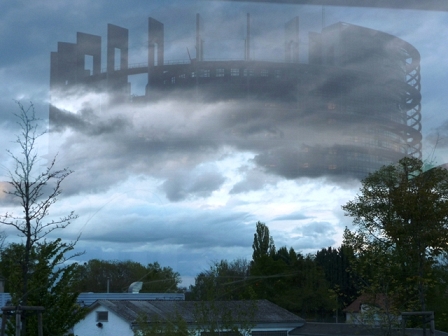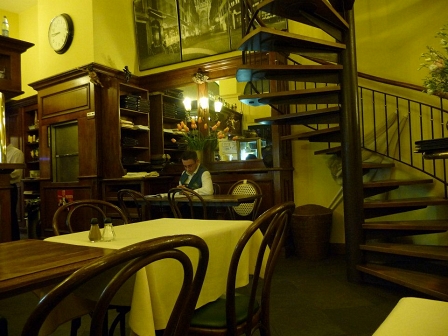Erstellt am: 27. 4. 2012 - 17:46 Uhr
Is It All Sausage?
Reflected in the perspex of a Strasbourg tram shelter, the European Parliament looked like a kingdom in the clouds. It seemed a fitting motif for an institution that has been accused of losing touch with ordinary Europeans – a 'sanitized bubble' that British political observer Simon Hoggart recently dismissed as a "tea party with pretensions"?

chris cummins
This is our parliament, insist the EU enthusiasts, a place where political representatives, directly elected by you or me, scrutinize the proposed laws that will govern our lives, considering them from the perspective of both their party and country, and voting in our interest. Johannes Pollak from the Institute of Advanced Studies says the debates in its chambers are “much more open and closer to the liberal democratic ideal than in the national parliament.” There`s more readiness to compromise and more readiness to vote across party lines.
That`s the ideal. But for many Europeans, particularly the most active writers of letters to tabloid editors, it is a smug talk-shop. Figures from an IPPR survey in notoriously Eurosceptic Britain, released in February, showed that 78% believe their voice doesn't count in the EU Parliament, leading former British Home Secretary Jack Straw so far as to call on the Parliament to be abolished. The best turn-out figures for EU elections barely hit 40%. The institute is, to put it mildly, unloved.
"Bores and Pedants?"
If you take a selective view of EU business, it is not hard to make the institution seem ridiculous. When I arrived in Strasbourg the tabloids were gleefully reporting an EU battle over sausages. Slovenia had applied for official recognition and protected status for its "Krainer" sausages, because of the meat's connection to the Kranjska region. Austria, where cheese-ejaculating Käsekrainers are much loved, was worried – would those meddlesome Eurocrats make us rename our sausages, instead of tackling unemployment rates which had hit a 14 year high? The sausage story, as well as a story about voluntary firefighters being asked to punch the clock, was perfect fodder for those who see the EU as glass house full of bores and pedants.
chris cummins
It has also been attacked for its rising costs – a bill which is, of course, ultimately footed by European tax-payers. A report from last year called "Ending Excess, cutting the costs of the European Parliament", co-written by vehemently Eurosceptic MEPs Geoffrey Van Orden of the UK and Derk Jan Eppink of the Netherlands, suggested that the European Parliament costs 1.69 billion euros a year to run and employed 6,000 well paid officials drinking subsidized coffee and alcohol at the Parliament’s bars. The report said the costs had risen by 18% in the past two years and that is an awkward statistic at a time in which much of Europe is under the cudgel of EU approved austerity measures. In October 2010 MEPs agreed to increase the EU budget by 5.9% at a time when many EU member nations were making cuts in domestic services. Here in Austria, where cost-cutting has been relatively mild, a recent Eurobarometer study showed that one in two Austrians thought the EU was wasting their money.
Automatic For The People
Faced with this, many MEPs feel undervalued and deliberately misunderstood. They feel press coverage of the more arcane aspects of their work is rarely put into context. Austrian Social Democrat MEP Evelyn Regner told me that she and her colleagues spend 10 hours a day discussing primarily measures against youth unemployment and ideas for economic stimuli and “perhaps 2 minutes” on disputes over regional specialties such as the Krainer label for sausages. She told me she spends a few days a week in Austria canvassing opinion, both face-to-face and via social networking, so that she can defend these local interests on a European level.
Regner added that much of the legislation that is derided as petty in the Eurosceptic press, such as a recent bill to protect hairdressers from harmful chemicals, is a vital part of the framework that ensures European workers and consumers have rights that are the envy of other parts of the world.
Far from being out of touch, she presents the EU Parliament as our buffer against corporate greed and suggests that certain industry lobbies have an interest in seeing the rulings mocked in the press since EU protection laws could add cost or complications to their businesses. In her view MEPs are a valuable counterbalance to market forces and protect workers from unscrupulous cost-cutting employers.
Dieses Element ist nicht mehr verfügbar
But it is no good moaning about the press coverage, Austrian conservative MEP Heinz Becker argued when I met him outside the bee-hive shaped plenary hall. He thinks the political elite in national parliaments and the European Parliament have, for decades, failed to convince their voters that they are working efficiently in their interests. The only way to combat this crisis of trust, he told me, is through passing legislation that voters see as relevant and helpful. “Now is the time to work, work and work.”
But now, with 25 million European Union citizens out of work and youth unemployment in particular spiraling out of control, Becker feels MEPs have a golden chance to prove the doubters wrong: “The European Union or the European idea has a very good chance now to prove that the challenges of today, whether economic, financial or demographic, cannot be handled by any single national state.”
The Six Pack
What is needed, he insists, is structural change enforced not by vague promises but by real penalties. “National governments built up a mountain of debts. They spent too much over many years and now this has been stopped by a mutually agreed package of measures.” The measures that Becker is referring to, passed last December, have been dubbed the “six pack” – a sort of common framework of Eurozone budgets that should guarantee more transparency and consistency meaning finance ministers can’t hide away their burgeoning debts until it is too late. Similar principles were signed into law two decades ago, but this time it will be easier to exact penalties from governments who flout the standards. Becker told me no chancellor or prime minister will want to explain to his population why 600 million euros of their tax money is being spent on paying financial penalties. Greens' MEP Ulrike Lunacek insisted that ordinary Europeans would benefit from the Parliament’s endeavors to tackle tax competition and reduce bank secrecy.
chris cummins
So much for the sticks but what about the carrots? It is hard to believe in a grey Europe of rule-books. Where is its heart? Many young Europeans, particularly in the Mediterranean states, lack prospects and hope, as their national governments, kowtowing either to bail-out terms or to power of the credit agencies, impose harsh austerity measures. The European Parliament doesn’t have the competence to dictate social policy to national governments but, once again, Social Democrat MEP Evelyn Regner would like to see a Europe where the dictates of the markets do not trump the needs of the people: “Young people see governments driving to save money, but they don’t see them investing in their future,” she complains, calling it a huge imbalance. “We need to offer enough investment and enough innovation to combat youth unemployment. It`s really urgent.”
Self-Criticism
Aware of the accusations of inefficiency and complacency, the MEPs I met in Strasbourg were in a self-critical mood. Dutch Liberal-Democrat MEP, Sophie in 't Veld, told me the Parliament had been “passive and timid” in agreeing to hand over European airline passenger data, including our health problems and ethnicity, to the US Homeland Security, where she fears our data will be used for profiling and says we should wish for a stronger, more confident Europe to stick up for our rights.
Dieses Element ist nicht mehr verfügbar
Human rights rapporteur Richard Howitt, meanwhile, complained that the European Union had ethically slept through the Arab Spring, negotiating better trade links with the Gaddafi regime just four weeks before the Anglo-French bombing campaign began. MEPs have just backed his proposal for a new human rights “Csar”, a figurehead who Howitt is sure “will have real clout on the international stage.”
Dieses Element ist nicht mehr verfügbar
Many MEPs think the way to increase public trust in the Parliament is through such clearly visible statements of confidence. In short, they think more action of a European level, not less will bridge the gap between the EU and the people it represents. They say, for example, it was not unnecessary meddling, but a stride forward in social progress when, last month, it backed calls for quotas to put more women into company boardrooms and called for EU-wide measures to boost female representation in politics.
Europe, they say, can push for more fairness when national governments stumble and stall. Europe has to mean a better, fairer world – it must capture people`s imagination. They point out to the work they have done in terms of anti-discrimination legislation, in protecting our clear water and air and making the testing of chemicals more stringent (many health-damaging chemicals commonly used in the USA are banned in Europe.

chris cummins
Jack Straw disagrees, Speaking at an Institute for Public Policy Research he insisted that “the EU should not be involved in issues like the working time directive, health and safety and so on.” Europe should do less he argues, but do it better.


